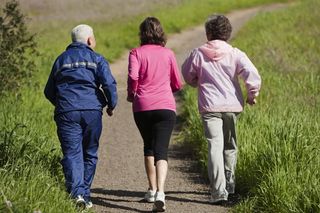
Six Months of Regular Exercise Can Lend a Cognitive Boost
For the elderly, an active lifestyle seems to combat mental decline.

Rather than go in search of the fountain of youth, people in their twilight years may want to incorporate regular exercise if they want to to turn back the clock on aging. Specifically, those concerned with cognitive impairment as they age may benefit from regular cardiovascular exercise. A new study in the journal Neurology showed that after just six months of regular aerobic exercise, participants’ scores on thinking tests improved by the equivalent of roughly 9 years of aging.
James A. Blumenthal, PhD, of Duke University Medical Center in Durham, N.C., lead author of the study, limited the study to people who had cognitive impairments without dementia, which is defined as having difficulty concentrating, making decisions, or remembering, but not severe enough to be diagnosed with dementia. The study specifically tested those participants’ executive function, or a person’s ability to regulate their own behavior, pay attention, organize and achieve goals.
The study involved 160 people with an average age of 65 and risk factors for heart disease, such as hypertension, who did not have dementia but reported problems with thinking skills. All participants were sedentary at the start of the study.
Researchers examined the effects of both exercise and diet, specifically the Dietary Approaches to Stop Hypertension (DASH) diet, which is a low sodium, high fiber diet rich in fruits and vegetables, beans, nuts, low fat dairy products, whole grains, and lean meats. The DASH diet was designed specifically for individuals with high blood pressure. For the group that did exercise, the routine consisted of 10 minutes of warm-up exercises and 35 minutes of aerobic exercise, such as walking, jogging, or cycling on a stationary bicycle.
At both the beginning and end of the six-month study, researchers evaluated participants’ thinking and memory abilities with standardized cognitive testing. Researchers found that participants who exercised showed significant improvements in thinking skills when compared to those who did not exercise. Those who took part in both the exercise and diet had average scores of nearly 47 points on the overall tests of executive thinking skills, compared to an average score of about 42 points for those with exercise and diet alone and about 38 points for those who just received health education.
For those who received only health education, i.e., no change in sedentary lifestyle or diet, their performance on executive function tests worsened by a half year from their scores at the start of the study; in other words, their cognitive aging followed its natural course.
Taken together, the results could suggest that a combination of exercise and the DASH diet together confer an even greater benefit than exercise alone. However, this study used a small sample size and more research would be needed to confirm that. However, even in its limited scope, this study adds further evidence to the overwhelming body of data that illustrates just how vital physical activity is to keeping our bodies and minds working.
Related


Depression, Anxiety May Take Toll on Health as Much as Smoking, Obesity
